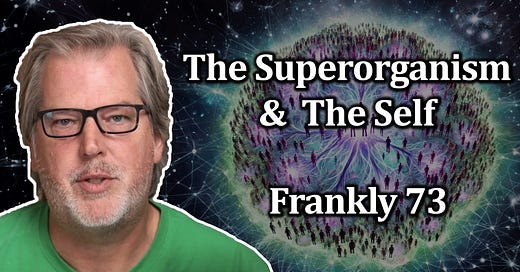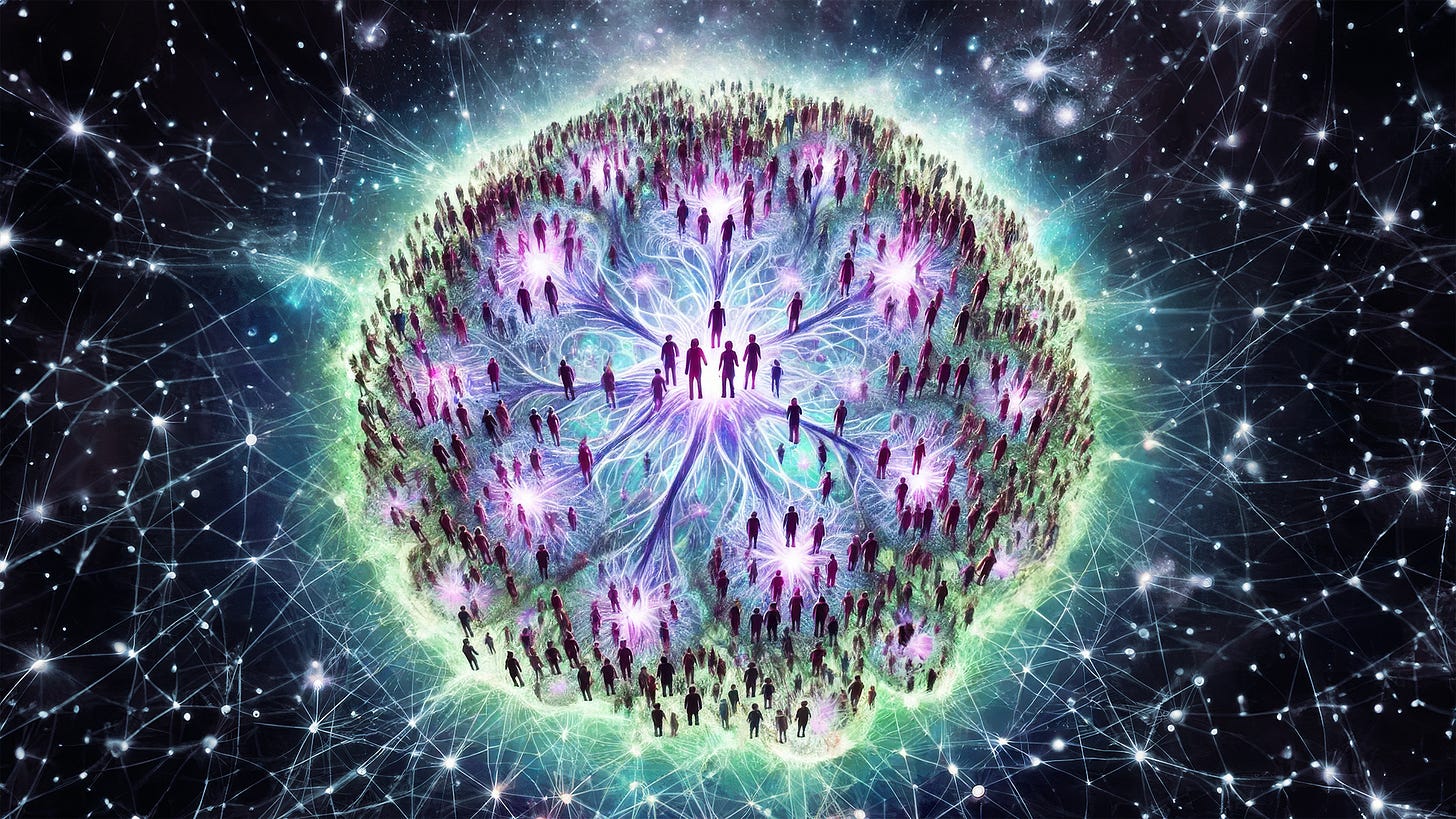My work tends to focus on systems-level analysis of the current (and future) global macro/ecological situation. But peering beneath the surface of that system lies the deeply personal, emotional experiences of individuals, locally and around the world. In today’s Frankly, I navigate the delicate balance between systems thinking and the profound emotional weight of the realities we face.
The Superorganism and the Self coexist in a recursive dance: while the Superorganism influences individual experiences, those experiences collectively influence the Superorganism. The centuries-long prioritization of profit over wellbeing is casting a shadow over the lived experiences of individuals: as material wealth and convenient consumption soar (for many), we are seeing increasingly deteriorating mental health and social fragmentation. Yet the growing recognition of the totality of this predicament is also triggering shifts in awareness within and between individuals - fostering interconnection and perhaps even the emergence of islands of coherence.
In what ways has the economic Superorganism turned us into a species out of context and how is this affecting the embodied experiences of the individual? How might returning to a lived experience of interconnection create ripple effects throughout our fragmented society? Could something be emerging beneath the surface of this failing system?
In case you missed it…
In this week’s episode, I welcomed forest ecologist Suzanne Simard to explore the forces that shape forest ecosystems, from the critical role of biodiversity in nutrient dispersal among tree species to the worrisome implications of the monoculture and clear-cutting practices common in the timber industry.
If you appreciate The Great Simplification podcast…
Be sure to leave a review on your preferred podcast platform! Leaving reviews helps the podcast grow, which helps spread awareness of our systemic situation from experts in ecology, energy, policy, economics, technology, and community building so that we can better understand - and respond to - the challenges of the coming decade.
The Great Simplification podcast is produced by The Institute for the Study of Energy and Our Future (ISEOF), a 501(c)(3) organization. We want to keep all content completely free to view globally and without ads. If you’d like to support ISEOF and it’s content via donation, please use the link below.






Grief has been described as love with nowhere to go.
One of the things that has always resonated with me is your ability to connect with your emotions. It doesn’t get talked about enough, I say this as a 48 year old male. We don’t set an example that this is a valid way to navigate the world.
Your journey from a materialistic perspective to one of interconnection mirrors my own, this has been unfolding in a profound way over the last few years. I use the same words and make the same clarification about the definition of materialism. We each have our own gateway into this connectedness journey, and in my case if I look back there were many on ramps that I ignored. The path for me was being intentional about feeling my feelings, a small thing with profound ramifications. Notice the tingling up your spine, the shivers you get, the moments of tightness and constriction. Your body and your mind are here to work together, spending more time building this awareness is a powerful thing, in truth it is an internal compass.
My journey to greater self awareness and consciousness is something that I started to experience in my mid forties, my daughter started her journey in her late teens. Our collective consciousness seems is evolving, we see it in successive generations. My hope is that a better understanding of ourselves and our connectedness are the tools need to help us make a planet preserving, planet loving transition.
❤️
Deep sympathy for your loss of Maisy.
Social fracturing has been with us since we became human. I just finished reading Catching Fire: How Cooking Made Us Human by Richard Wrangham. Cooking evolved homo habilis into homo erectus. In order to cook routinely, we needed to hunt and gather, which produced the first surplus, even if surplus only lasted a few hours.
Surplus meant property. The time spent for cooking and its preparation required protection. Protection fell to men, so cooking fell to women, trapping women in bondage to a male protection racket. So slavery has been with us since we were homo erectus, and slavery is certainly a fracturing social institution.
The carbon pulse has lengthened lives and allowed reduction in childbearing, making each child and marital bond more precious. A social benefit of the carbon pulse is a reduction of human and animal slavery, and another is permission to love and grieve. Perhaps as we turn the peak of the pulse, we can experience what Joanna Macy calls The Great Turning, and begin to heal from our original homo erectus conflict.
Healing is never pleasant. It hurts. It itches. It has side effects. Go ahead and weep, dear Nate, and may you be healed. Your grief is rooted in love.
Your followers feel your love, and we love you in return. Namaste.